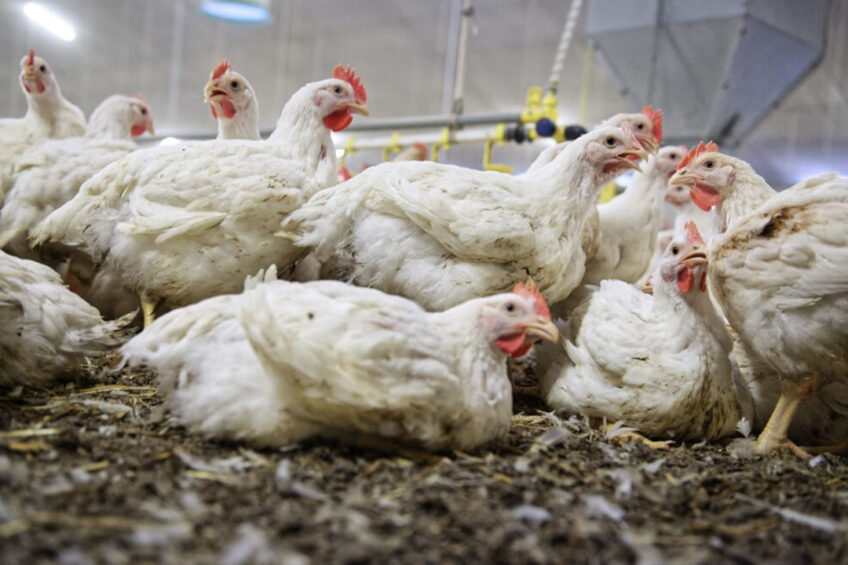Application of organic acids in the broiler industry

Organic acids are promising alternatives for antibiotics in broiler production systems.
In intensive broiler production systems, feed additives are necessary to improve performance and productivity. In the past, antibiotics have been used as growth promoters to increase production and improve gut health. However, due to the problem of antibiotic resistance in animals and humans and antibiotics residues in meat and egg, it is recommended to use other safe alternatives to maintain the growth and feed efficiency of broilers.
Organic acids are promising alternatives that are used as feed preservatives and in addition they increase feed intake, growth, and feed efficiency and improve gut health and integrity in broilers.
Supplementing with organic acids
Organic acids have several applications in the broiler industry. Organic acid supplementation has growth-promoting effects in broilers due to the creation of a suitable environment for growth-enhancing bacteria. Including organic acids such as propionic acid, formic acid, citric acid, and acetic acid in broiler feed improves feed intake, growth, feed efficiency, the feed conversion ratio and performance.
The improved feed conversion ratio in broilers supplemented with organic acids could be due to enhanced nutrients consumption, which results in higher weight gain. The improved performance of broilers in response to the supplementation of organic acid is because of the increased digestibility of energy and protein contents of the feed, fewer microbial pathogens, improved immunity, reduced infectious level, and a lower level of ammonia and harmful metabolites.
Moreover, organic acids such as benzoic acid, acetic acid, and their salts, such as sodium benzoate and sodium acetate are used as a feed preservative by reducing gut pH and thus limiting the growth of bacteria.
The antibacterial activity of organic acid is related to its acid chemistry, the bacterial species, media composition, and growth conditions. In addition, citric acid improves the development of Lactobacillus spp. in the gut and inhibits the growth and proliferation of pathogenic bacteria such as Salmonella and Escherichia coli by activating the proteolytic enzymes, absorption of minerals, reduction of ammonia and growth-depressing microbial metabolites, and stimulation of feed intake.
Organic acids also improve intestinal integrity by reducing the number of pathogenic bacteria and limiting their entry into the intestinal mucosa which, in turn, decreases the subsequent inflammatory process in broilers gut. In the following sections, studies on the effect of organic acid supplementation in broilers are discussed.
Growth-promoting effects
In 2009, a study found that supplementation with 0.5% citric acid increased feed intake, growth, carcass yield, and bone ash in broilers. Another study determined that a diet supplemented with acetic acid, citric acid, and lactic acid enhanced live body weight in broilers. It is also found that supplementation of citric acid improved feed consumption and feed efficiency in broilers and that supplementation of ascorbic, malic acid, and tartaric acid increased weight gain and feed efficiency.
In addition, research showed enhanced broiler weight in response to 0.4% butyrate and a higher growth performance in broilers in response to supplementation with 0.9% organic acid. It is reported that a diet supplemented with a combination of sodium butyrate, citric acid, phosphoric acid, acetic acid, propionic acid, formic acid, and lactic acid improved growth performance in broilers.
Antimicrobial effect
Treating feed with 1% formic acid for 5 days reduces Salmonella, according to research. It is also found that citric acid solution reduced the growth of Listeria monocytogenes on poultry legs stored at 4°C for 8 days and that the addition of 0.9% organic acid to broilers’ diet reversed Salmonella colonisation.
Intestinal integrity
It has been demonstrated that organic acid-supplemented meals protected gut cells against disruption by decreasing toxin synthesis in the gut, which in turn led to reduced mucosal permeability of the gut. Organic acids in different doses and combinations have resulted in improved villus height, width, crypt depth in the ileum, duodenum, and jejunum in broilers.
It is reported that short chain fatty acids consisting of different blends of organic acid amended the gut health in broilers infected with necrotic enteritis. Also, that the antimicrobial action exerted by the long-chain fatty acids produced from cranberry pomace fermentation promoted a better immunological response to the infectious bursal disease virus and the Newcastle disease virus. It also levelled up the meat’s nutritional quality.
Administration in broiler feed
Administration of organic acids in broiler diet is a common problem which needs to be solved in order to improve their nutritional availability. Application of organic acid salts with sodium, potassium, or calcium provides a solid form with a better smell. In addition, microencapsulation, which includes the application of an undegradable film that envelopes the organic acid particles and allows a more effective release of these substances, is another solution.
Furthermore, a combination of organic acids can be used to improve broilers’ performance and gut health. Mainly, short-chain fatty acids reduce the number of Enterococcus spp. which infect one-day-old birds and they are more efficient in reducing the number of Faecalibacteria in broilers compared with medium-chain fatty acids. Researchers determined that wheat bran with a 280 µm particle size had a fast fermentation which produced butyric acid. Butyric acid was involved in easing Salmonella propagation in the gut by applying an antimicrobial effect, which in turn improved broilers’ performance.
Conclusion
Organic acids are a good alternative resource for antibiotics with growth-promoting effects, antimicrobial effects, and the potential to improve gut health and integrity. Organic acids provide a sustainable resource that can be used to maximise broilers’ performance and productivity.
The remarkable potential of organic acids needs to be further developed with the application of molecular, biotechnological, and nanotechnological science and technologies. In addition, further research is required to optimise organic acids dose, duration, concentration, and the exact mechanism of action to validate their beneficial uses in the broiler industry.
The information in this article has been extracted from the article ‘Prospects of organic acids as safe alternative to antibiotics in broiler chickens’ diet’ published in the journal Environmental Science and Pollution Research (2022).







